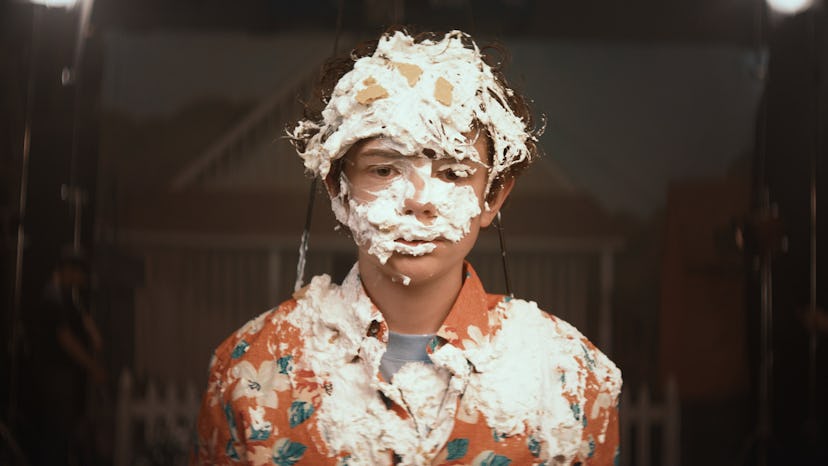Sundance: Shia LaBeouf’s Traumatic, Autobiographical Honey Boy Could Change How We Think of Him

The 2019 Sundance Film Festival began with some surprises. There were a few high profile disappointments and the revelation that Shia LaBeouf is a fascinating artist. The film he wrote and co-starred in, Honey Boy, has LeBeouf playing a fictionalized version of his own father, a former alcoholic rodeo clown who finds new employment as a paid chaperone to his own son, 12-year-old Otis (Noah Jupe playing a young Shia). Like the film’s author, Otis grows up to be a successful action star who gets thrown in rehab after too many drunken altercations with police. Lucas Hedges plays the grown-up version of Otis/Shia, as he is forced, through exposure therapy for PTSD, to remember the childhood that traumatized him.
The films alternates between scenes of grown up and childhood Otis, as Hedges recalls and eventually writes and role-plays his own story. The present day scenes are a bit stodgy: too familiar tableaux of rehab life and Hedges somehow reeking stability, not very credible as the black-hole of self-hate and sarcasm he’s supposed to be. The childhood scenes are never less than magnetic, though. LeBeouf is brilliant as the charming scoundrel whose serious faults include verbal and physical abuse, complete lack of boundaries, neglect, and eventually drug abuse. Yet throughout this worst-case scenario of bad parenting he never loses his charisma in a loving and empathetic portrayal.
As great as LeBeouf is, young Jupe is even better. He’s a child actor playing a child actor completely naturalistically, except for the scenes in which he purposefully overacts in his Disney-esque sitcom. He is jaded adult and vulnerable child at the same moment—too much maturity while desperately seeking affection—and all of it plays out on his face. It’s the best child performance since Tatum O’Neal’s Oscar winning turn with her own father in Paper Moon. Honey Boy (deftly directed by Alma Har’el) is a remarkably nuanced and thorough depiction of trauma as it’s happening and as it’s re-lived. It also puts into context LeBeouf’s previous performance art work (which I admit I found dubious) and public bad behavior. A therapist in the film asks Hedges-as-Shia, “Are you acting now?” Is this film acting, too? A deliberate strategy to correct his reputation? I don’t think so; it’s too raw and real, but asking those questions is what makes the film intriguing.
Emma Thompson in *Late Night*. Courtesy Sundance.
A movie that started strong and slowly drained of vitality is Late Night, written by and starring Mindy Kaling as a chemical plant worker who gets her dream job as a late night talk show writer. The host of the show is Katherine Newbury (Emma Thompson), who has been compared to Meryl Streep in The Devil Wears Prada but comes off more as a tame version of Tilda Swinton mixed with Hillary Clinton. Crucially, though, the late night talk show host rarely comes off as genuinely funny. Thompson is good in the dramatic elements but surprisingly seems to be off her comic timing here. (In contrast, Ike Barinholtz is completely credible as her nemesis, a Daniel Tosh-esque offensive stand-up, and Kaling is hilarious.) What really muddles the film, though, is its politics. Kaling’s character Molly Patel is openly called a diversity hire, after Thompson was called out for having an all-male writers’ room. The talk show is so determined to hire any woman that they hire a factory worker with zero writing experience, which only plays into the conservative myth that hiring women and POC will lead to hiring those with no experience. Why address something obviously false in such a direct and goofy way? Kaling’s character is also often called a WOC diversity hire but the whiteness of the TV show is never addressed, only its sexism. It’s one issue at time, and that issue is the kind of feminism that involves excellent women in pantsuits telling jokes about reproductive freedom. Late Night begins promisingly with pratfalls and hard laughs, but detours to sentimentality and oversimplicity. It’s too bad because these issues could use a parody, a Hollywood Shuffle for sexism in film and TV.
Ashton Sanders in *Native Son*. Courtesy Sundance.
Another film at Sundance with muddled politics, but in a more complex brew, is Native Son, a modern day version of the 1940 Richard Wright novel directed by artist Rashid Johnson. Ashton Sanders plays Bigger Thomas, better known as Big, a punk rocker delivery boy who lives with his family in Chicago. When he takes on a better paying job as a chauffeur for a rich white family, the Daltons, their college-age daughter Mary, a young rich leftist, takes a shine to Big. She and her boyfriend Jan make Big take them to his neighborhood for “some real food,” where they want to hang out with him as both buddies and employers. It’s remarkable and tragic how well these scenes from the novel translate to the modern day. “I don’t know about Mary,” says Big’s girlfriend Bessie, played by Kiki Layne. “I think she’s kind of crazy.” And Margaret Qualley (daughter of Andie MacDowell) does indeed play Mary as a kind of sparking loose wire, a neurotic instability that’s fascinating to watch on screen.
Sanders also gives a good performance in the lead role of Big, but it’s a bit mannered and unusual, reminiscent of Dana Ashbrook’s skulking, stomping alienated teen in the original Twin Peaks. Native Son has other elements in common with Twin Peaks, though Johnson never directly references David Lynch in any way, unlike many lesser directors. Both Lynch and Johnson are fine artists used to complete control. Their work in film feels meaningful in each frame and every sound, yet it’s also hard to place or define, outside reality or era.